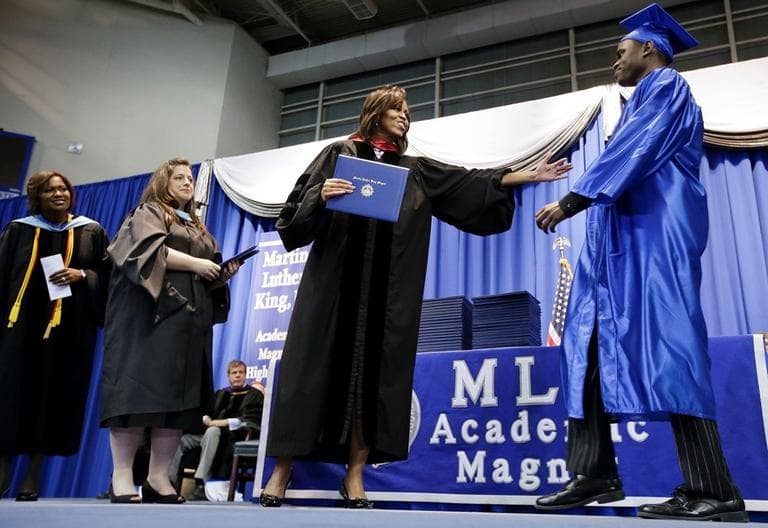Advertisement
A Message For Black High School Graduates
Resume
Last weekend, First Lady Michelle Obama had this advice for the Class of 2013 at the Martin Luther King Jr. Academic Magnet High School in Nashville:
"When something doesn't go your way, you've just got to adjust. You've got to dig deep and work like crazy, and that's when you'll find out what you're really made of during those hard times. But you can only do that if you're willing to put yourself in a position where you might fail, and that's why so often failure is the key to success for so many great people."
Ivory Toldson couldn't agree more — he's living proof.
Toldson was labelled a slow learner in fourth grade. He's now a tenured associate professor in Howard University's Counseling Psychology program and serves as editor-in-chief of The Journal of Negro Education.
"A lot of those messages make you believe that you have to disconnect yourself from your culture in order to succeed."
He has some advice on what black high school graduates need to hear as they receive their diplomas in coming weeks.
"A lot of times they get the tough love, scared straight, finger-waving type message. A lot of times it's replete with negative statistics and oftentimes untrue statistics like 'there's more black men in prison than college,' which isn't true but it tends to make it into a lot of speeches," Toldson told Here & Now's Meghna Chakrabarti .
Toldson says he often heard those messages when he was young.
"It's hard not to internalize a lot of those messages," he said. "A lot of those messages make you believe that you have to disconnect yourself from your culture in order to succeed. And that becomes a struggle and a conflict for a lot of black children, because they grow up in a certain environment, they love the people that they've been around, but they're constantly being bombarded with these messages that the people who may be close to you may actually be holding you back."
Commencement speeches should instead create a personal narrative of success, Toldson said, because too many urban black students believe that living in troubled communities means they can't become successful.
"A lot of the people who come out of those communities, when they do succeed, they have more problem-solving abilities, they have stronger resilience," he said. "What I advise people to do is not to harp on negativity, but help people to access the community strengths, and help people to understand that your personal narrative can come out of that community and actually make you a stronger person than you might be otherwise."
"When they do succeed, they have more problem-solving abilities, they have stronger resilience."
Toldson said if he was to give a high school graduation speech to young black students, he would first insert some history they may not have heard in their schools.
"A lot of the curriculum that black kids get doesn't really tell them about their true history, and it makes the contributions of black people to this nation a very passive contribution, like the narrative of us being freed as a result of the Civil War is something that these kids get, when in fact there was an ongoing struggle among black people."
One historical figure Toldson notes is a black general named Garson, who inherited a fort left behind by British soldiers after the War of 1812. Garson attracted a black militia and eventually raided some Georgia plantations to free other black people.
"When the word got out that there was this well-equipped fort in Spanish-occupied Florida that was run by black people, there were a lot of complaints to the U.S. government and a general at the time, Andrew Jackson, led an effort to destroy the fort," Toldson said.
- Toldson's piece in The Root: What Black High School Grads Need to Hear
Guest:
- Ivory A. Toldson, Ph.D., associate professor in the counseling psychology program at Howard University. He tweets @toldson.
This segment aired on May 23, 2013.